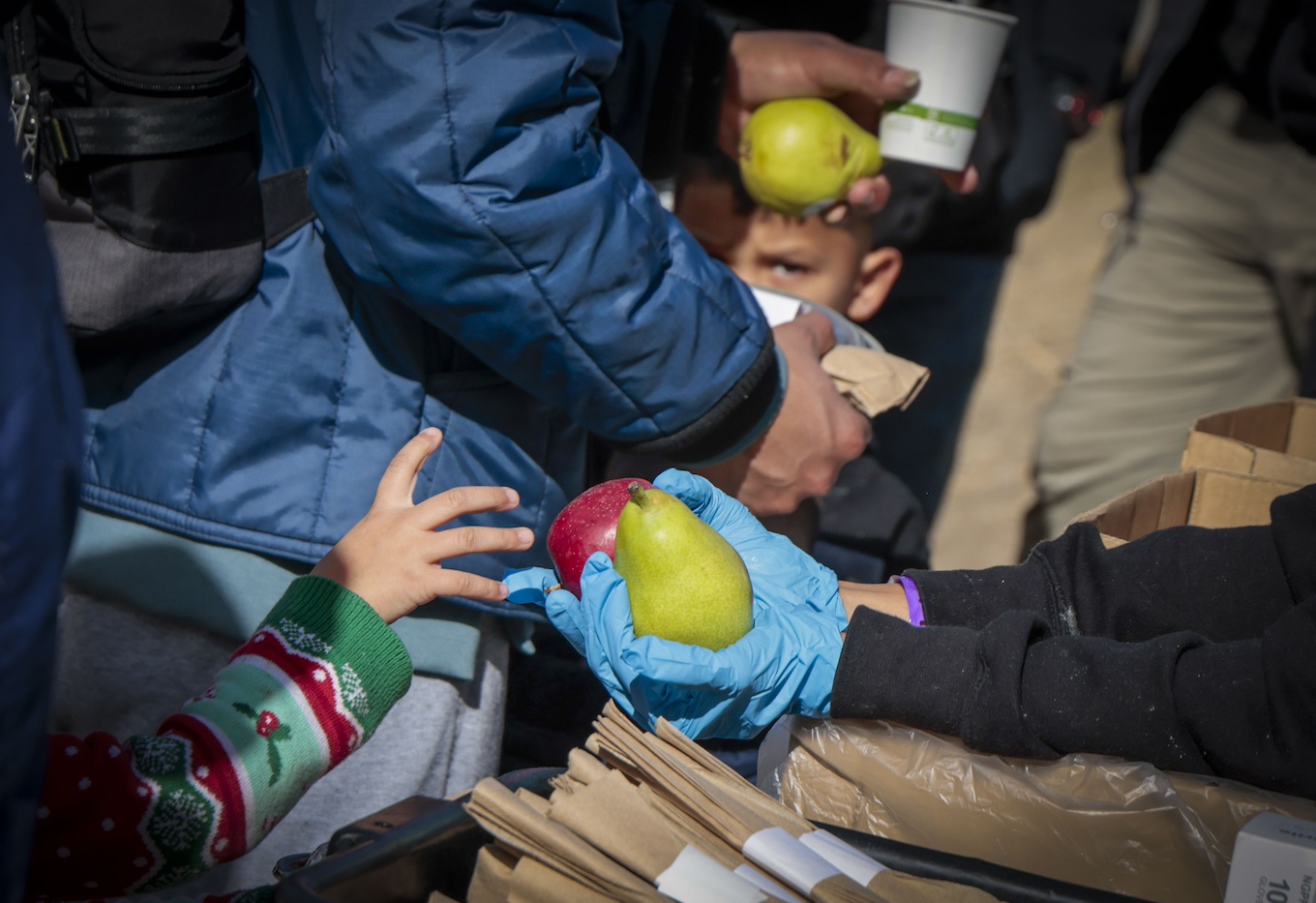
A volunteer hands out fruit to a child during a SAME Café Denver meal distribution on Jan. 31, 2024 at a city-leased hotel in east Denver. Photo by Joe Mahoney / Special to The Colorado Trust
A volunteer hands out fruit to a child during a SAME Café Denver meal distribution on Jan. 31, 2024 at a city-leased hotel in east Denver. Photo by Joe Mahoney / Special to The Colorado Trust
It’s Jan. 31, and Gloria and Alexander (who asked to withhold their last names for safety reasons) have only been in Denver for three days. They speak with me, with the help of an interpreter, on a sidewalk behind the hotel where they’re being sheltered while their 6-year-old son plays nearby.
Gloria holds a bag with their lunches—bowls filled with pulled pork, beans, rice and vegetables, and fresh fruit—in her hands. Alexander sips hot coffee and laughs: “It’s good even without sugar.”
Last night, they missed dinner because they did not understand some of the rules of the hotel-turned-shelter run by the City of Denver. They say this donated hot meal is closer to the food they’re used to eating back in Colombia.
Since early January, staff and volunteers from SAME (So All May Eat) Café Denver—a restaurant where people can pay, volunteer their time or donate fresh produce for a meal—have brought 200 warm lunches to this site most Mondays, Wednesdays and Fridays. (To protect the safety of the immigrants, the café has requested that the exact hotel not be disclosed.)
During SAME Café Denver’s first service, which was 100 meals, “we ran out very fast,” says head chef Kim Brazile. “A lot of people walked away without food.”
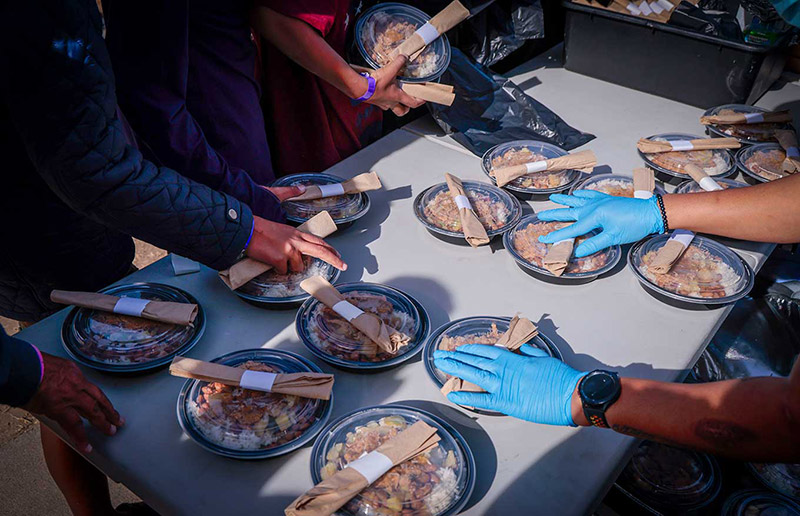
SAME Café Denver is distributing hundreds of free meals each week to newly arrived immigrants. Most meals contain rice, beans, pork or turkey, and more if donations allow. Photo by Joe Mahoney / Special to The Colorado Trust
According to the city’s dashboard, 38,391 immigrants have been served since January 2023. On Feb. 6, the city reported that 3,726 were being sheltered, down from a high of 5,204 on Jan. 11. The City and County of Denver operates 10 shelters for immigrants, seven of which are hotel properties. To qualify for a spot in a shelter, a person needs to have been in the country for less than 30 days.
(It’s worth noting that government officials generally refer to these recent arrivals as migrants; however, we’ve decided to use the term “immigrant” throughout. Per widely used definitions, immigrants travel to a different country to settle there, whereas migrants are people who are on the move within their own country or across borders. So the recent arrivals were migrants when they were in transit but are now considered immigrants since they hope to remain in the U.S. More specifically, in many cases they are asylum seekers.)
Though the city provides breakfast and dinner to everyone (kids also receive lunch), Denverites have been filling in the gaps. SAME Café Denver was brought into the fold by Rachel Handler, leader of a grassroots group of neighbors organized via Facebook, who provides resources to recently arrived immigrants. Handler helped organize a meal train, which is still ongoing and has also provided donated medicine to this east Denver shelter site. Since Dec. 8, Handler and others have served a daily meal to at least 100 immigrants and raised more than $4,000 for supplies.
Gloria’s family flew to Mexico City, took buses to the border in Texas and then were bussed to Denver. Now, they’re sharing a two-bed, one-bathroom hotel room with a family of four. They were excited to learn about SAME Café’s lunches—a break from the repetitive meals at the hotel.
“You want to be thankful,” Gloria says, but the city-provided food is not always enough.
Alexander talks excitedly as he pulls up cell phone photos of his favorite foods from home, such as sancocho, a hearty stew, and bandeja paisa, a platter filled with chorizo, plantains, beans and more.
“We didn’t come here to be anybody’s burden,” Alexander says. “We need to work and produce and become independent.”
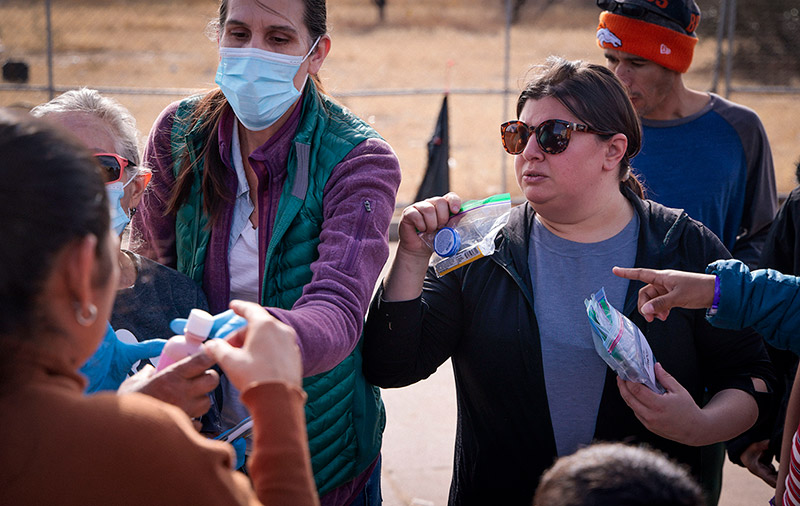
Patricia Whyde (l.) and Rachel Handler distribute medical supplies to newly arrived immigrants during the Jan. 31 meal distribution. Photo by Joe Mahoney / Special to The Colorado Trust
****
The basement of SAME Café carries the heady scent of meat roasting for hours. On this morning in late January, Chef Brazile arrived at 7 a.m. to prepare pounds of rice and reheat the pork she’d cooked for hours the day earlier.
The storage room is filled with metal shelves stacked with bags of gluten-free flour and jasmine rice, containers filled with spaghetti squash, rows of cups and boxes of garbage bags. Most of it has been donated. In the corner, Brazile and two volunteers efficiently fill a couple of disposable containers at a time with white rice, beans, potatoes, onions, peppers, and shredded pork topped with pear barbecue sauce.
The sealed containers will be loaded into soft-sided cooler bags, then placed in the café’s white van—along with two crates of apples and one of pears, hot coffee, silverware and cups—and driven about 10 miles to the waiting lineup of immigrants who are being temporarily sheltered at the hotel in east Denver.
Brazile is pretty consistent with her menus: a rice and bean base topped with either turkey or pork. She wants it to be nutritious and culturally appropriate for the diners, who are primarily from South America. (Depending on donations, she might also add in something sweet.) Brazile hears that they’re enjoying the food and that it’s filling.
“My hope is they can get two meals out of one bowl,” she says.
Though it’s a new project, this work isn’t unfamiliar to the SAME Café Denver team. In 2020, when the COVID-19 pandemic forced the restaurant to shutter temporarily, they pivoted to providing to-go and delivery meals to community members without access to housing or transportation.
The immigrant lunches cost SAME Café about $3 per bowl. The eatery has been able to cook them entirely from financial and product donations and not dig into its own supply, but the business does pay for coffee, containers, labor and gas. They’ve already raised more than $4,500 toward the effort. (Individuals can sign up to volunteer for this work or donate food or money. The city also maintains a list of needed donations.)
“It’s just morphing into a part of our everyday service here,” says Carrie Shores, SAME Café Denver’s executive director. “This is something that we do every day. We don’t just respond to a temporary crisis or need.”
Upstairs from where Brazile and the volunteers are filling bowls, SAME Café continues its regular lunchtime operation, serving healthy, from-scratch meals weekdays from 11 a.m. to 2:30 p.m. Maria Determan, SAME Café Denver’s bilingual community outreach coordinator, hands out cards in Spanish that invite recipients to a free meal at SAME to build awareness of the restaurant as a resource. One family told her they’d walked two hours to reach the café for a meal and to see familiar faces.
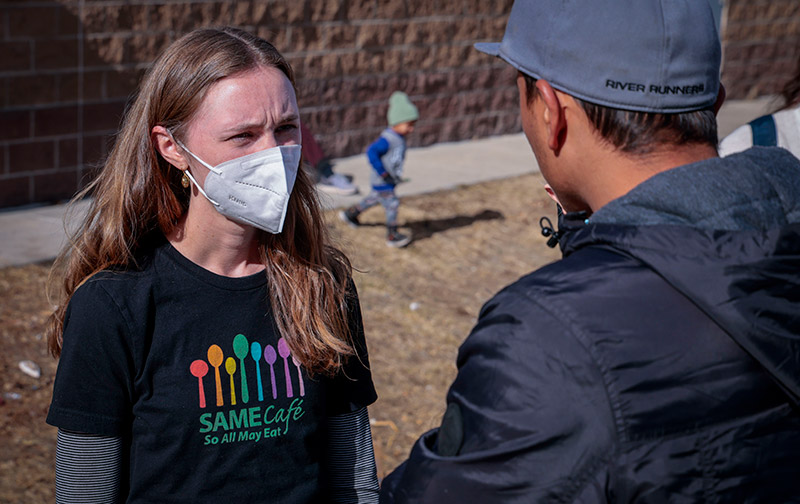
Maria Determan, SAME Café Denver’s bilingual community outreach coordinator, answers questions at the Jan. 31 meal distribution in east Denver. Photo by Joe Mahoney / Special to The Colorado Trust
SAME Café plans to continue providing on-site meals at the hotel shelter through the end of February. Still, Shores says the project is essentially month-to-month based on need, the restaurant’s staff and donation capacity. And the need is changing.
In mid-January, Denver Mayor Mike Johnston announced that as of Feb. 5, officials will limit how long immigrants can stay in city-operated shelters—42 days for families and 14 days for individuals. (This is a return to a previous policy that the administration halted in November 2023 amid freezing temperatures.) The mayor said that budget issues and lack of federal support are making it impossible to continue providing services at the same rate.
Dozens of people are expected to be discharged from shelters every day for the next two months. SAME Café Denver may move to provide meals at another shelter if fewer people are at the east Denver site following the current discharges.
“We’re here to support, and the support will continue as long as the need is there and we have the capacity,” Shores says, “but also we know things could change really quickly.”
****
Sustenance is, of course, only one of the new immigrants’ critical needs. The other is a way to make money so they can build a life here or elsewhere in the U.S.
Daniel, 31, has been staying at the east Denver shelter for a month with his wife and two kids (ages 7 and 4) and must leave on March 30.
“When they kick us out, what are we going to do?” he asks after picking up his SAME Café-provided meal. He’s taken on odd jobs that put a little money in his pocket but not enough to cover rent.
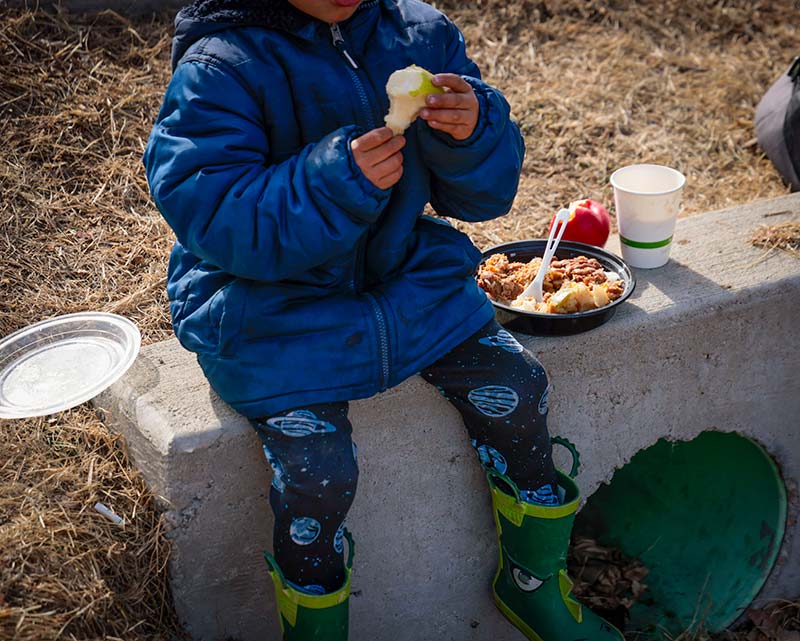
A child eats a pear and a hot meal at the Jan. 31 meal distribution in east Denver. Photo by Joe Mahoney / Special to The Colorado Trust
Median rent for a one-bedroom is $1,531 in Denver and $1,403 in Aurora, and Denver continues to be tens of thousands of units shy of needed affordable housing.
“Work authorization is a federal process,” says Jon Ewing, a Denver Department of Human Services spokesperson. Immigrants’ status when they arrive impacts when and how they become eligible to work. (Denverite recently published a thorough explainer of how these permits can be accessed and why the process is so time-consuming.) The city is adding more legal and work clinics to provide information and assistance, and Mayor Johnston has been exploring ways to hire immigrants to work for the city, but the path is unclear.
City staff have conversations with newly arrived immigrants about how expensive the city is and encourage them to consider where they might be able to find work more easily. Some people end up in Denver who never intended to settle here, Ewing says; in those cases, the city helps them acquire bus tickets to their preferred destination, which may be with already settled family or friends.
“No one’s being forced to get on a bus or anything like that. But we do try to advise them of their options,” Ewing says. “Nearly half of the people we’ve served have wanted a bus ticket elsewhere.”
Ewing says that community support like SAME Café Denver’s and the meal train have been critical in providing adequate resources amid the city’s budget restraints. “I can’t thank the community enough for all they’ve done. We’re going to need them over the next few months. I fully expect [the number of] arrivals are going to come roaring back to life.”
The sidewalk outside the east Denver hotel is less bustling than in early January, but there are still plenty of people to feed. It’s a surprisingly warm January day, and kids run around, transforming empty boxes into sleds that they ride down a small dirt hill. One boy sits on a storm drain, munching on a crisp apple.
Julia Carrasquero arrived in Denver with seven family members. It took them six months to travel, on foot, from Venezuela to the U.S. Beyond the food, which she likes, the medicine Handler provides via donations is essential. Carrasquero’s grandchild is sick with chicken pox, which has broken out among the children.
More kids than adults are waiting for SAME Café’s pop-up lunch. Immigrants are invited to help distribute meals to their fellow lodgers from behind two folding tables. Others help direct the queue to move forward a few people at a time to avoid crowding.
“It’s a huge part of it being a dignified experience,” says Determan. “We’re not serving the food—we’re providing the food. Whatever we have, we’ll give.”
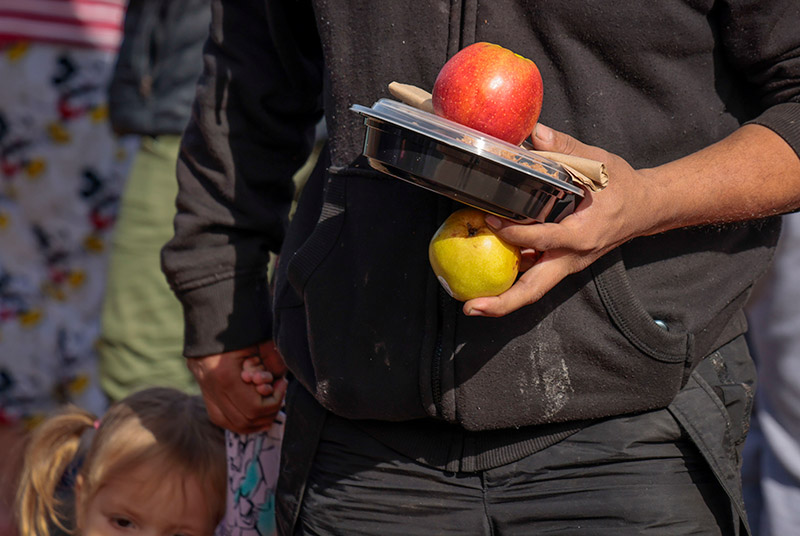
Photo by Joe Mahoney / Special to The Colorado Trust